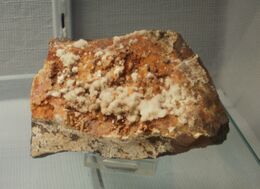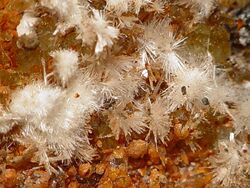Chemistry:Rapidcreekite
| Rapidcreekite | |
|---|---|
 Rapidcreekite from the Rapid Creek area, Yukon, Canada | |
| General | |
| Category | Sulfate minerals Carbonate minerals |
| Formula (repeating unit) | Ca2(SO4)(CO3)·4H2O |
| Strunz classification | 7.DG.20[1] |
| Dana classification | 32.2.1.1[1] |
| Crystal system | Orthorhombic |
| Crystal class | Dipyramidal (mmm) H-M symbol: (2/m 2/m 2/m) |
| Space group | Pcnb |
| Unit cell | a = 15.517(2) Å b = 19.226(3) Å c = 6.1646(8) Å; Z = 8 |
| Identification | |
| Color | White to colorless |
| Crystal habit | Elongated, flattened to acicular crystals in radiating sprays or crust forming |
| Cleavage | Perfect on {010} Good on {100} |
| Fracture | Splintery |
| Tenacity | Brittle |
| Mohs scale hardness | 2 |
| |re|er}} | Vitreous |
| Streak | White |
| Diaphaneity | Transparent |
| Specific gravity | 2.239 (calculated) |
| Optical properties | Biaxial (+) |
| Refractive index | nα = 1.516 nβ = 1.518 nγ = 1.531[1] |
| Birefringence | δ = 0.015[1] |
| 2V angle | 45° (measured) |
| Dispersion | None[1] |
| Ultraviolet fluorescence | Non-fluorescent[2] |
| Solubility | Dissolves slowly in 10% HCl[3] |
| References | [4] |
Rapidcreekite is a rare mineral with formula Ca2(SO4)(CO3)·4H2O. The mineral is white to colorless and occurs as groupings of acicular (needle-shaped) crystals. It was discovered in 1983 in northern Yukon, Canada, and described in 1986. Rapidcreekite is structurally and compositionally similar to gypsum.
Description

Rapidcreekite is transparent and white to colorless.[4] The mineral occurs as isolated clusters or pervasive crusts of radiating sprays of acicular crystals up to 3 mm (0.12 in) in length.[2][4]
Structure
In the structure of rapidcreekite, there are two distinct calcium sites coordinated by six oxygen anions and two H2O groups arranged as a square antiprism. The sulfur site is tetrahedrally coordinated by oxygen anions and the carbon site is coordinated by a triangle of oxygen anions. The structural unit of rapidcreekite is a sheet that consists of edge-sharing CaΦ8 polyhedra (Φ, unspecified species: O or OH) cross-linked by carbonate and sulfate groups. Sheets are held together by weakening hydrogen bonds, accounting for the perfect cleavage along {100}.[6]
The structure and composition of rapidcreekite is similar to that of gypsum. If half of the sulfate groups in gypsum were replaced by carbonate, the formula of rapidcreekite is obtained.[7] If gypsum were transformed by twinning along alternate rows of sulfate groups and the resultant triangles of oxygen along the boundary occupied by carbon, the structure of rapidcreekite would result.[8]
History
Rapidcreekite was first encountered in 1983 in a tributary of Rapid Creek unofficially known as Crosscut Creek at [ ⚑ ] 68°33′45″N 136°47′30″W / 68.5625°N 136.79167°W in northern Yukon.[9] The mineral was named rapidcreekite for the general area in which it was found.[2] The mineral and name were approved by the IMA Commission on New Minerals and Mineral Names (IMA1984-035).[1][2] Rapidcreekite was described in 1986 in the journal Canadian Mineralogist.[9]
The holotype specimen, which consists of a few grams of rapidcreekite on a matrix, is held in the National Mineral Collection of the Geological Survey of Canada in Ottawa. Other specimens are held there and in the National Museum of Natural Sciences in Ottawa.[2]
Occurrence
Rapidcreekite occurs in association with aragonite, gypsum, and kulanite.[4] It has been found in Canada, Germany, Norway, and Romania.[1] The rare mineral occurs as a secondary phase that formed along the surfaces of joints and bedding planes in a quartz-rich sideritic formation.[4][9] In the Rapid Creek area, the formation occurred in Albian ironstones and shales.[6][9]
References
- ↑ 1.0 1.1 1.2 1.3 1.4 1.5 1.6 "Rapidcreekite". Mindat. http://www.mindat.org/min-3366.html.
- ↑ 2.0 2.1 2.2 2.3 2.4 Roberts et al. 1986, p. 52
- ↑ Roberts et al. 1986, p. 53
- ↑ 4.0 4.1 4.2 4.3 4.4 Anthony, John W.; Bideaux, Richard A.; Bladh, Kenneth W. et al., eds. "Rapidcreekite". Handbook of Mineralogy. Chantilly, VA: Mineralogical Society of America. http://www.handbookofmineralogy.com/pdfs/rapidcreekite.pdf.
- ↑ Warr, L.N. (2021). "IMA–CNMNC approved mineral symbols". Mineralogical Magazine 85 (3): 291–320. doi:10.1180/mgm.2021.43. Bibcode: 2021MinM...85..291W.
- ↑ 6.0 6.1 Cooper & Hawthorne 1996, p. 99
- ↑ Cooper & Hawthorne 1996, p. 103
- ↑ Cooper & Hawthorne 1996, p. 104
- ↑ 9.0 9.1 9.2 9.3 Roberts et al. 1986, p. 51
- Bibliography
- Cooper, Mark A.; Hawthorne, Frank C. (Feb 1996). "The crystal structure of rapidcreekite, Ca2(SO4)(CO3)(H2O)4, and its relation to the structure of gypsum". Canadian Mineralogist 34 (1): 99–106. http://rruff.info/uploads/CM34_99.pdf.
- Roberts, Andrew C.; Ansell, H. Gary; Jonasson, Ian R.; Grice, Joel D.; Ramik, Robert A. (March 1986). "Rapidcreekite, a new hydrated calcium sulfate-carbonate from the Rapid Creek area, Yukon Territory". Canadian Mineralogist 24 (1): 51–54. http://rruff.info/uploads/CM24_51.pdf.
External links
 |

